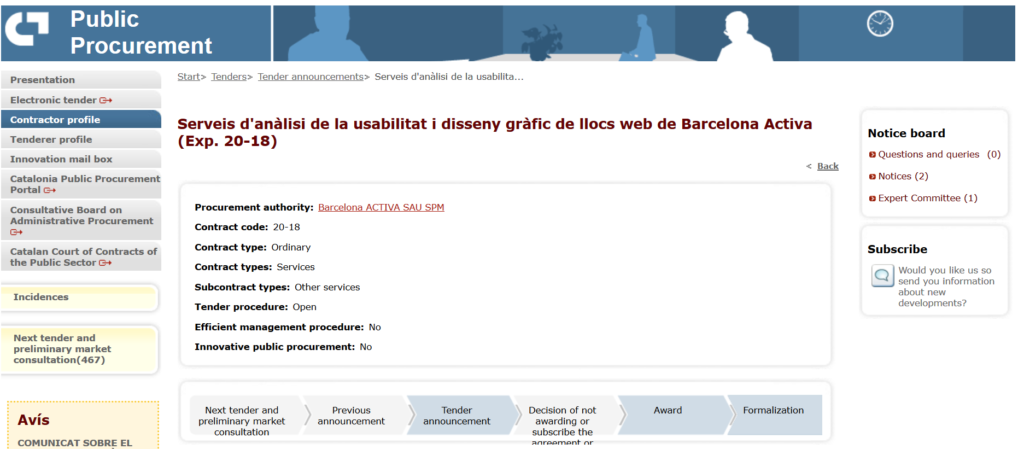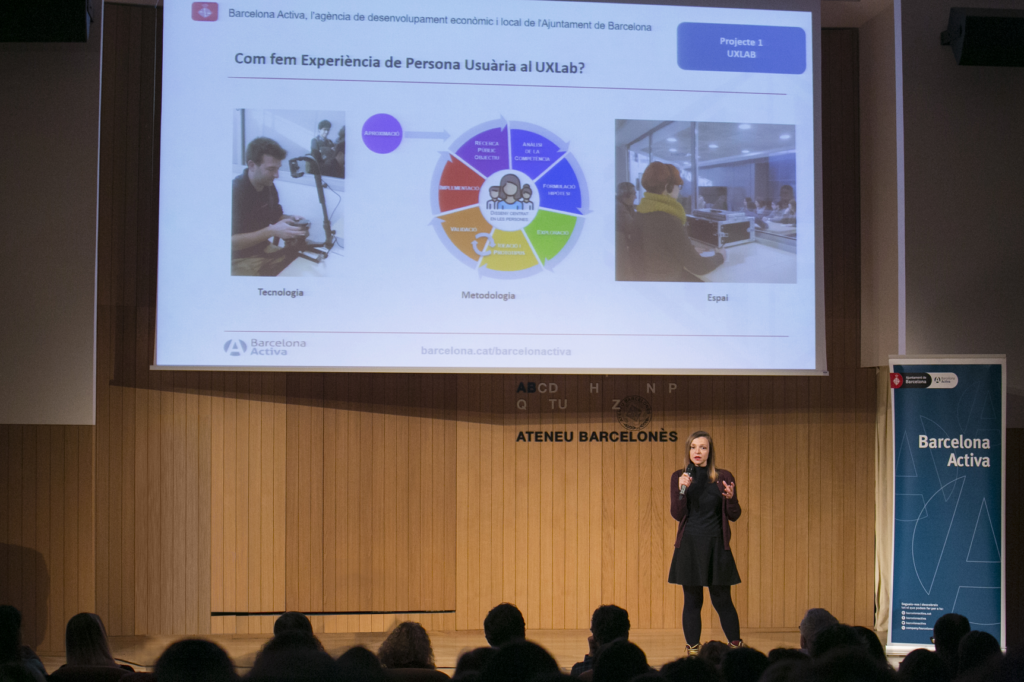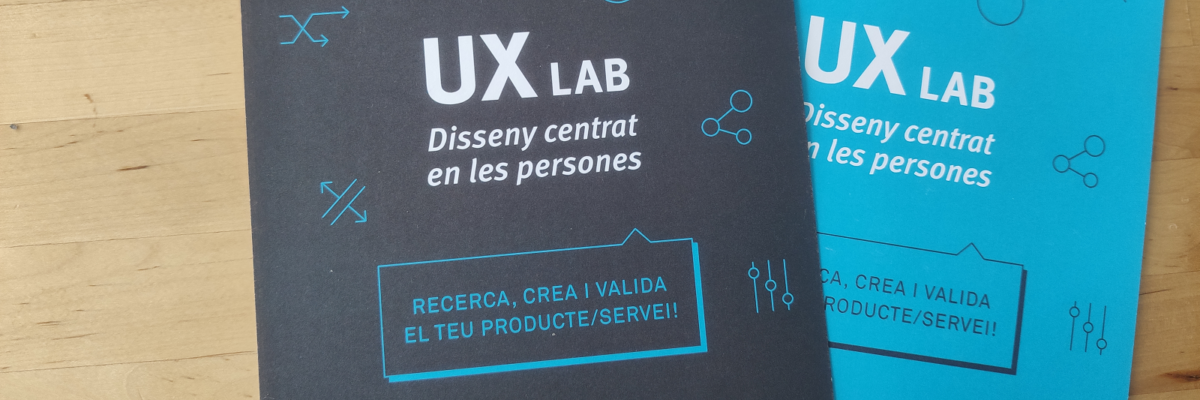The first UX Lab held by a public organization in Spain. A huge challenge, it sounds scary: Let’s volunteer.
In 2017, I arrived at Barcelona Activa with the huge responsibility of starting the new Public UX Service. During my time working there, the idea of the UXLab, has evolved from a service to allow companies to test products, to a mentoring service that helps start-ups with their UX practices.
The UXLab service has been designed continuously as it happened, taking into account the same things we ask the companies to care about. Failing fast, applying UX methodologies to the work done and continuous improvement have been the flesh and bones of this project.
Failing fast, applying UX methodologies to the work done and continuous improvement have been the flesh and bones of this project.
During this time:
- More than 100 companies have been benefited from the service.
- Another person has joined the project.
- UX mindset has been established in Barcelona Activa.
- The scope of the project has changed from only testing to UX mentorship.
- Start-ups learn on a learn-by-doing basis.
If you want further detail, this is the story behind the scenes.
UXLab: Tree-year-long everyday service design.
The UXLab service has been designed continuously as it happened.
There have been quite a work and challenges during the process.
Practise what you preach: Introduce UX mindset in the company.
Shortly after being hired, I realised a huge part of my working hours would be spent in UX evangelization because I was the first UX person ever in the company.
During that time there were several websites in progress, and I was asked for advice and I detected there were no UX or usability roadmap in those projects.
How could it be possible? On the one hand, Barcelona Activa had an UXLab service, we were speaking to star-ups about the importance of testing and usability, but on the other hand, we weren’t testing our websites.
Achievement:
From the 8th of March 2018, every web project in Barcelona Activa has its own budget to study usability.

Learning: You are not a consultant
At first, I made this mistake, I played the role of a UX Consultant. I had meetings with start-ups and after, I spent a lot of time doing reports, heuristic analysis, etc.
Fine, all my work ended under a pile of papers and no UX improvements were made.
Pitfall: Reports are too big, too formal, they didn’t work. Start-ups are short on money but also short on time. They need guidance as well.
It’s difficult to lead a UX Service for start-ups and see the benefits being offered aren’t that valuable to them, right?
Fix:
Lean UX is the key to start-ups.
After all these years I’ve realised there are 3 possible roles to play when I start working with a start-up.
- UX Evangelist: The company is not aware of the impact UX and research may have on their business.
Work plan: Mentorship and proving with examples the benefits the service has brought to other companies. Easy validation activities, mainly guerrilla. - UX Advisor and Researcher: The business is aware about the importance of UX but has no money to hire a UX specialist.
Work plan: I help them to carry out some guerrilla research, to get validation, define UX roadmap.
If during the process formal research test that demand experienced skills are required like in-depth interviews, focus groups, usability testing, eye tracking studies, etc. I plan, coordinate and conduct the research for them. - UX Leader: The start-up I mentor has an in-company UX person.
Wok plan: Empower in-company UXers to be better UX practitioners, provide guidance, introduce and encourage best practices and assist them to implement UX strategy and achieve goals in their companies.
Change the scope of the project: The UXLab shouldn’t be just testing.
When I arrived at Barcelona Activa the purpose of the UXLab project was to provide a testing space for start-ups. Everything revolved around the laboratory and testing.
The UX researcher I am wasn’t pleased with that idea. Testing is great, but without framing it in context, it may be not that great. You need to do some previous work in advance to make it useful. You need to know who you have to test with, be aware of the bias, balance between qualitative and quantitative techniques, etc.
So, the purpose was clear: The UXLab Service had to be more than a testing lab, all those previous work was really important to avoid it. The service should be agile, data and evidence driven.
In addition, providing start-ups with a free testing service may cause some long-term problems
- They will not change their habits, there will be no awareness about UX if they didn’t practise the methods.
- When they no longer have access to the service, if they cannot pay for the tests, UX will be forgotten.
Outcomes:
The service is held by three pillars, the user-centric methodologies worked with startups, the laboratory, and the technology.

And of course, I didn’t just have to evangelize over those within the organization, since I also had to defend the value of the whole process with the start-ups I was working with.
Hands-on: Build a Toolkit
My first-day toolkit at Barcelona Activa was:
- An external study providing some guidelines to carry on the implementation of the service.
- Some architecture plans to turn some meeting rooms into a laboratory.
- My background and experience.
During all this time working with start-ups, we have been incorporating tools to do a better and more agile job for companies.
Today’s UXLab tookit includes:
- UX-Canvas: A mixed and blended version of different canvas you can find on the internet.
During the first UXLab session, the company fills the canvas out. After the canvas is completed I ask the company to grab another colour and tick the parts they have data to endorse what is written. This is really useful to show how a company is working on assumptions. - Lean UX artefacts: State of the problem, proto-personas, hypothesis, etc.
These tools help startups to stay on track during the whole process. - Stakeholder table: Whenever we are working with consultancy start-ups, identifying stakeholders is a must.
- Wireframing kit: Facilitating web co-creation with business people is easier when you use it.
- Journey maps: To define the experience in every touching point.
- Test plan documents: Every time a test takes place in the UXLab, test strategy, objectives, tasks, schedule, resources required for testing, estimation and deliverables are defined in a document. The test plan serves as a blueprint to conduct testing activities as a defined process.
- Research findings documents: After every test, we work on findings to come with new outcomes that smooth the experience and keep the UX loop alive.
